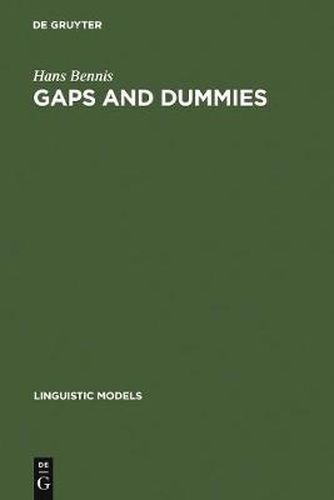Readings Newsletter
Become a Readings Member to make your shopping experience even easier.
Sign in or sign up for free!
You’re not far away from qualifying for FREE standard shipping within Australia
You’ve qualified for FREE standard shipping within Australia
The cart is loading…






This title is printed to order. This book may have been self-published. If so, we cannot guarantee the quality of the content. In the main most books will have gone through the editing process however some may not. We therefore suggest that you be aware of this before ordering this book. If in doubt check either the author or publisher’s details as we are unable to accept any returns unless they are faulty. Please contact us if you have any questions.
In this study the syntactic properties of empty categories and dummy pronouns are investigated within the framework of Government-Binding theory. The assumption that clauses must have a subject is present in most, if not all, linguistic theories. In GB theory the requirement that clauses have a subject is stipulated as a consequence of the base rules or the Extended Projection Principle. In this book it is claimed that no such stipulation is necessary. The presence of a subject is exclusively determined by the theories of thematic roles and Case.This view is supported by the fact that the alleged dummy subjects Dutch, i.e. er and het, show a variety of properties, which can only be explained if they are not analyzed as dummy subjects. Further confirmation is derived from the fact that Dutch, subjectless sentences are found in precisely those circumstances in which neither -theory nor Case theory requires a subject to be present. Chapter 1 presents a theory of empty categories. This theory enables us to explain the distribution of gaps, and makes precise and correct predictions with respect to the occurrence of parasitic gaps.The non-dummy status of het, discussed in chapter 2, is supported by the fact that it can be the antecedent of PRO, reflexives, and parasitic gaps, and by an asymmetry in wh-movement from sentential complements. The analysis of het leads to a discussion of a variety of constructions, including constructions with raising, ergative, and psychological verbs. The adverbial pronoun er displays several distinct syntactic functions. In chapter 3 it is argued that none of these different functions justifies an analysis of er as a dummy subject.In chapter 4 some of the consequences of the theory introduced in the preceding chapters are investigated. These include a discussion of the status of the subject position in languages such as English, Italian, French, and Spanish, the structure of Old English, and the status of dummy pronouns in German and English.
$9.00 standard shipping within Australia
FREE standard shipping within Australia for orders over $100.00
Express & International shipping calculated at checkout
This title is printed to order. This book may have been self-published. If so, we cannot guarantee the quality of the content. In the main most books will have gone through the editing process however some may not. We therefore suggest that you be aware of this before ordering this book. If in doubt check either the author or publisher’s details as we are unable to accept any returns unless they are faulty. Please contact us if you have any questions.
In this study the syntactic properties of empty categories and dummy pronouns are investigated within the framework of Government-Binding theory. The assumption that clauses must have a subject is present in most, if not all, linguistic theories. In GB theory the requirement that clauses have a subject is stipulated as a consequence of the base rules or the Extended Projection Principle. In this book it is claimed that no such stipulation is necessary. The presence of a subject is exclusively determined by the theories of thematic roles and Case.This view is supported by the fact that the alleged dummy subjects Dutch, i.e. er and het, show a variety of properties, which can only be explained if they are not analyzed as dummy subjects. Further confirmation is derived from the fact that Dutch, subjectless sentences are found in precisely those circumstances in which neither -theory nor Case theory requires a subject to be present. Chapter 1 presents a theory of empty categories. This theory enables us to explain the distribution of gaps, and makes precise and correct predictions with respect to the occurrence of parasitic gaps.The non-dummy status of het, discussed in chapter 2, is supported by the fact that it can be the antecedent of PRO, reflexives, and parasitic gaps, and by an asymmetry in wh-movement from sentential complements. The analysis of het leads to a discussion of a variety of constructions, including constructions with raising, ergative, and psychological verbs. The adverbial pronoun er displays several distinct syntactic functions. In chapter 3 it is argued that none of these different functions justifies an analysis of er as a dummy subject.In chapter 4 some of the consequences of the theory introduced in the preceding chapters are investigated. These include a discussion of the status of the subject position in languages such as English, Italian, French, and Spanish, the structure of Old English, and the status of dummy pronouns in German and English.